
Werner Herzog is a German film director, screenwriter, author, actor, and opera director, regarded as a pioneer of New German Cinema. His films often feature ambitious protagonists with impossible dreams, people with unusual talents in obscure fields, or individuals in conflict with nature. His filmmaking process includes disregarding storyboards, emphasizing improvisation, and placing the cast and crew into similar situations to characters in his films.

Klaus Kinski was a German actor, equally renowned for his intense performance style and notorious for his volatile personality. He appeared in over 130 film roles in a career that spanned 40 years, from 1948 to 1988. He played leading parts in five films directed by Werner Herzog, who later chronicled their tumultuous relationship in the documentary My Best Fiend (1999).
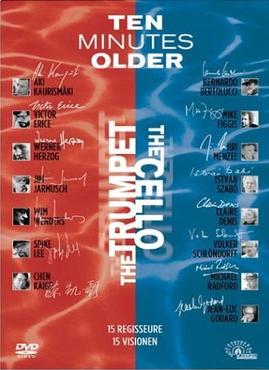
Ten Minutes Older is a 2002 film project consisting of two compilation feature films titled The Trumpet and The Cello. The project was conceived by the producer Nicolas McClintock as a reflection on the theme of time at the turn of the Millennium. Fifteen celebrated filmmakers were invited to create their own vision of what time means in ten minutes of film. The music for the compilations was composed by Paul Englishby, and performed by Hugh Masekela (trumpet) and Claudio Bohorques (cello).
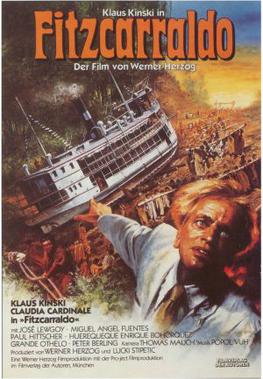
Fitzcarraldo is a 1982 West German epic adventure-drama film written, produced, and directed by Werner Herzog, and starring Klaus Kinski as would-be rubber baron Brian Sweeney Fitzgerald, an Irishman known in Peru as Fitzcarraldo, who is determined to transport a steamship over a steep hill to access a rich rubber territory in the Amazon basin. The character was inspired by Peruvian rubber baron Carlos Fitzcarrald, who once transported a disassembled steamboat over the Isthmus of Fitzcarrald.
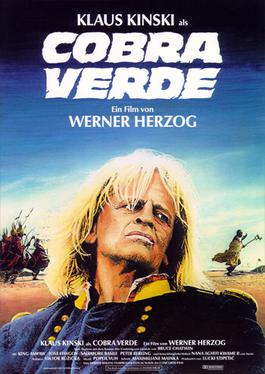
Cobra Verde is a 1987 German drama film directed by Werner Herzog and starring Klaus Kinski, in their fifth and final collaboration. Based upon Bruce Chatwin's 1980 novel The Viceroy of Ouidah, the film depicts the life of a fictional slave trader who travels to the West African kingdom of Dahomey. It was filmed on location in Ghana, Brazil, and Colombia.
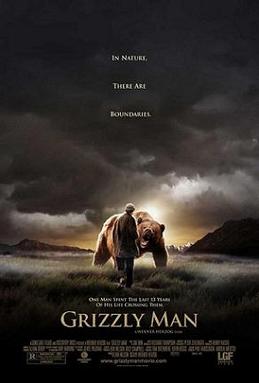
Grizzly Man is a 2005 American documentary film by German director Werner Herzog. It chronicles the life and death of bear enthusiast Timothy Treadwell and the death of his girlfriend Amie Huguenard at Katmai National Park, Alaska. The film includes some of Treadwell's own footage of his interactions with brown bears before 2003, and of interviews with people who knew or were involved with Treadwell, in addition to those of professionals who deal with wild bears.

Werner Herzog Eats His Shoe is a short documentary film directed by Les Blank in 1980 that depicts director Werner Herzog living up to his alleged vow to eat his shoe if Errol Morris ever completed the film Gates of Heaven.

The Great Ecstasy of Woodcarver Steiner is a 1974 documentary film by German filmmaker Werner Herzog. It is about Walter Steiner, a celebrated ski jumper of his era who worked as a carpenter for his full-time occupation. Showcased is Steiner's quest for a world record in ski flying, as well as the dangers involved in the sport. Herzog has considered it one of his "most important films."
The Panará are an Indigenous people of Mato Grosso in the Brazilian Amazon. They farm and are hunter-gatherers.
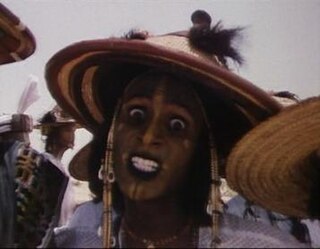
Herdsmen of the Sun is a 1989 documentary film by Werner Herzog. The film explores the social rituals and cultural celebrations of the Saharan nomadic Wodaabe tribe. Particular focus is given to the Gerewol celebration, which features an elaborate male beauty contest to win wives.
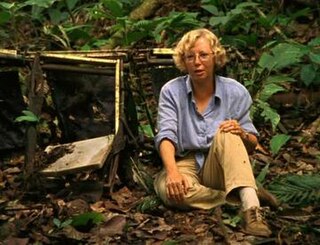
Wings of Hope is a 1998 made-for-TV documentary directed by Werner Herzog. The film explores the story of Juliane Koepcke, a German Peruvian woman who was the sole survivor of Peruvian flight LANSA Flight 508 following its mid-air disintegration after a lightning strike in 1971. Herzog was inspired to make this film since he had narrowly avoided taking the same flight while he was location scouting for Aguirre, the Wrath of God; his reservation had been canceled due to a last minute change in itinerary.
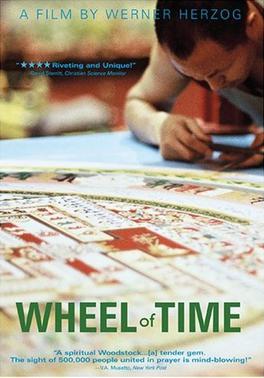
Wheel of Time is a 2003 documentary film about Tibetan Buddhism by German director Werner Herzog. The title refers to the Kalachakra sand mandala that provides a recurring image for the film.

Handicapped Future is a 1971 documentary film by Werner Herzog about physically disabled children in Munich.
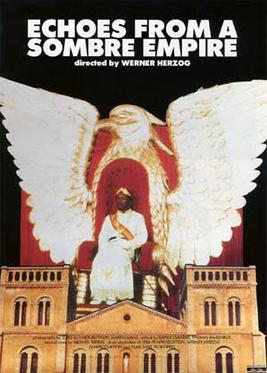
Echoes From a Sombre Empire is a documentary film by Werner Herzog about Jean-Bédel Bokassa.

Ballad of the Little Soldier is a 1984 documentary film directed by Werner Herzog and Denis Reichle about children soldiers in Nicaragua. The film focuses on a group of Miskito Indians who used children soldiers in their resistance against the Sandinistas.

Scream of Stone is a 1991 film directed by Werner Herzog about a climbing expedition on Cerro Torre. The film was shot on location at Cerro Torre, with several scenes filmed close to the summit.

Into the Abyss is a 2011 documentary film written and directed by Werner Herzog. It is about capital punishment, and focuses on a triple homicide that occurred in Conroe, Texas, in 2001. In the film, Herzog interviews the two young men convicted of the crime, Michael Perry and Jason Burkett, as well as family members and acquaintances of the victims and criminals, and individuals who have taken part in executions in Texas. The primary focus of the film is not the details of the case or the question of Michael and Jason's guilt or innocence, and, although Herzog's voice can be heard as he conducts the interviews, there is a minimal amount of narration, and he never appears onscreen, unlike in many of his films.

Nomad: In the Footsteps of Bruce Chatwin is a 2019 British documentary film by German director Werner Herzog. It chronicles the life of British travel writer Bruce Chatwin and includes interviews with Chatwin's widow, Elizabeth Chatwin, and biographer Nicholas Shakespeare, as well as detailing Herzog's own friendship and collaboration with the man.
Erik Nelson is an American documentary film director and television producer. Nelson has produced and directed several films, television specials and television programs such as Ripley's Believe It or Not!, Mega Disasters, When Good Times Go Bad, What Were You Thinking?, Unsolved History, Prehistoric Predators and More than Human.

Werner Herzog is a German filmmaker whose films often feature ambitious, sometimes mad protagonists with impossible dreams. Herzog's works span myriad genres and mediums, but he is particularly well known for his documentary films, which he typically narrates.


















